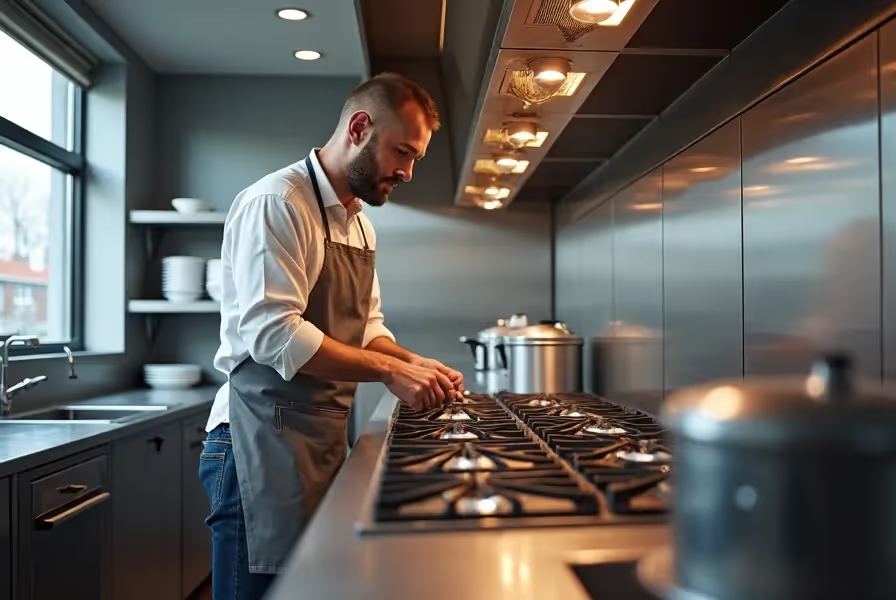Why Shared Kitchens in Chicago Need Professional Hood Cleaning
Shared kitchens in Chicago are more than just food prep spaces. They are collaborative hubs for food entrepreneurs, ghost kitchens, and culinary startups. With high-volume cooking and multiple users, the risks of grease buildup and fire hazards increase significantly.
Regular kitchen hood cleaning is not just a suggestion—it's a requirement. Whether you're a shared kitchen operator or a tenant, ensuring proper hood system maintenance helps you stay compliant, safe, and efficient.
How Grease Exhaust Systems Affect Health and Safety
The kitchen exhaust system plays a critical role in removing smoke, airborne grease, heat, and cooking odors from your environment. Over time, grease accumulates in the hood, ductwork, and exhaust fans.
If not cleaned regularly, this buildup can lead to:
- Increased fire risk in the duct system
- Non-compliance with NFPA 96 fire codes
- Poor airflow and kitchen ventilation problems
- Costly kitchen equipment damage
Health inspectors and fire marshals in Chicago take these issues seriously. If your shared kitchen hood system doesn’t meet standards, you risk citations, closure, or liability for damages.
Common Chicago Fire Code Violations in Shared Commercial Kitchens
Shared kitchens in Illinois have to meet the National Fire Protection Association (NFPA) standards. According to NFPA 96, hoods and grease exhaust systems must be cleaned regularly by trained professionals.
Typical fire code issues include:
- Excessive grease buildup inside the hood
- Clogged filters blocking airflow
- Ductwork not cleaned all the way to the fan
- Improper cleaning documentation and reporting
Professional hood cleaning services in Chicago help you prevent these issues and document everything required for inspections.
Benefits of Professional Hood Cleaning Services in Shared Kitchens
Working with a qualified kitchen exhaust cleaning service offers more than just compliance. It supports your team, protects your kitchen, and boosts your operational efficiency.
Here’s what a quality hood cleaning service provides shared kitchen operators and tenants:
- Deep cleaning of hoods, ducts, and exhaust fans
- Proper grease containment and disposal
- Detailed before-and-after photos for documentation
- Flexible after-hours scheduling to avoid downtime
- Certified technicians with insurance and training
Another major benefit is minimized fire hazard, helping you protect people, property, and your business reputation.
How Often Should Shared Kitchen Hoods Be Cleaned?
The frequency of hood cleaning depends on how often and what type of cooking you do. For shared kitchens with multiple users, the activity level is usually high. That means the hood system needs cleaning more often than in a single-use kitchen.
Based on NFPA 96 and local Chicago regulations:
- High-volume usage (woks, fryers): every 1 to 3 months
- Moderate usage (restaurants, cafés): every 3 to 6 months
- Low-volume or occasional use: up to 12 months
Staying proactive helps you avoid unexpected shutdowns and costly repairs later.
What to Look for in a Hood Cleaning Company in Chicago
Not all hood cleaners are the same. Choosing a reliable commercial hood cleaning company is an investment in safety and professionalism. Make sure to find a vendor who specializes in shared and commercial kitchens.
Look for features like:
- Valid certifications and NFPA 96 compliance
- Proof of insurance and training credentials
- Transparent quoting and fair pricing
- Flexible scheduling around your kitchen's needs
- Experience working in shared kitchen environments
Ask if the company provides compliance stickers, inspection reports, and photos after every cleaning. These are important for insurance and health department reviews.
Why Compliance With Kitchen Ventilation Laws Matters
Chicago and Illinois regulate air quality and fire safety standards for food establishments. Shared-use commercial kitchens must follow all local, state, and NFPA 96 guidelines. That includes proper ventilation system maintenance and documentation.
Failing to comply can cost you:
- Fines or penalties from city inspectors
- Removal from shared kitchen program or lease
- Insurance claim denials in case of fire
Regular exhaust system cleaning helps you avoid these risks and maintain a safe environment for all kitchen users.
Frequently Asked Questions About Hood Cleaning in Shared Kitchens
Do I need to provide my own cleaning service in a shared kitchen?
Sometimes, yes. It depends on the kitchen operator's policy. Some shared kitchens include hood cleaning in the rental fee, while others require individual tenants to manage it. Always clarify this before signing your lease agreement.
How long does a hood cleaning take?
Most professional hood cleanings take 2–4 hours, depending on the size and condition of the exhaust system. Larger shared kitchens may take longer, especially if it’s a multi-tenant operation.
Is hood cleaning required by law in Chicago?
Yes. The City of Chicago adopts the NFPA 96 fire code, which requires regular hood cleaning by certified contractors. This applies to all commercial kitchens, including shared-use and incubator kitchens.
How can I tell if my hood system needs cleaning?
Look for signs like visible grease, poor ventilation, strong cooking odors, or discoloration on surfaces. If it’s been more than three months since your last cleaning, schedule an inspection right away.
Will cleaning disrupt kitchen operations?
Not necessarily. Many contractors offer overnight or early morning appointments to reduce downtime. Always coordinate with your shared kitchen manager and tenants to plan ahead.
Take The Next Step Toward a Cleaner, Safer Kitchen
Operating a shared kitchen in Chicago requires attention to fire safety, cleanliness, and professionalism. Regular hood cleaning keeps your space safe, your tenants compliant, and your business protected.
Make hood system maintenance part of your kitchen’s standard operating procedure. Regular servicing isn’t just about code compliance—it’s about building trust with your tenants, customers, and community.
Commit to a clean, compliant kitchen. Choose certified hood cleaning professionals who understand the unique needs of shared-use cooking environments. Your future self—and your kitchen—will thank you.










.svg)



